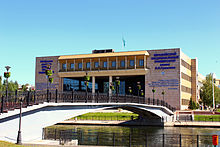Lev Nikolayevich Gumilev

Lev Nikolajewitsch Gumiljow ( Russian Лев Николаевич Гумилёв ; * October 1 July / October 14, 1912 greg. In Tsarskoye Selo near Saint Petersburg ; † June 15, 1992 in Saint Petersburg) was a Soviet historian and ethnologist, author of some new and controversial Theories of ethnogenesis as well as poets and translators from the Persian language . He was the son of the poet couple Anna Akhmatova and Nikolai Gumilev .
In addition to the “Russian idea” of the Slavophiles and the reference to Western social models, Gumilev put the “ Eurasian concept ” in which he predicted the unstoppable development of Russian history towards the East and in the long term attached little importance to the western movement that had only taken place in recent history .
Life
Lev Gumiljow spent his early childhood in the care of his paternal grandmother on the Slepnewo estate near Beschezk in the Tver governorate . From 1917 to 1929 he lived in Beschezk. When he was just under nine years old in 1921, his father Nikolai Gumilev was shot for alleged involvement in a counter-revolutionary conspiracy. Because of his origins, Gumiljow was not accepted at the university in 1930 and initially worked for four years as a laborer on expeditions to the Sayan Mountains , the Pamirs and the Crimea . In 1934 he began studying history at Leningrad University , but was expelled and arrested in 1935. Despite his early release, he was initially only able to continue his studies privately, he dealt intensively with the Turkic peoples . In 1937 the university accepted him again.
His freedom did not last long: he was arrested again in 1938 and sentenced to five years in a camp , which he spent in a copper-nickel mine in Norilsk . Following his imprisonment, he was released into de facto exile in Norilsk. He was not allowed to return home and worked in the shipping department of one of the local combines.
In autumn 1944 Gumiljow volunteered for the Red Army and fought in the 1st Belarusian Front , which was involved in the conquest of Berlin - so he was in Germany at the end of the war.
After retiring from the army in 1945, he re-enrolled as a correspondence student at Leningrad University and graduated in 1946. He began his traineeship at the Leningrad Department of the Institute of Oriental Studies of the Soviet Academy of Sciences , but was expelled in the same year in connection with the political persecution of his mother by the high-ranking politician Zhdanov . He then worked as a librarian in a psychotherapeutic hospital, but was given the opportunity to write his candidate thesis and defend it on December 28, 1948 before the Leningrad University. He then took part in an archaeological expedition to the Altai . In 1949 he took up a position as a research assistant at the Ethnographic Museum. In November of that year, he was arrested and sentenced to 10 years in a camp. He spent the first, predominant part of the detention period in Churubai-Nura near Karaganda , then in Meschduretschensk ( Kemerovo Oblast ). It was not until 1956, three years after Stalin's death, that he was rehabilitated for lack of grounds for imprisonment and released back home.

He worked in the Leningrad Hermitage and defended his dissertation as a doctor of science on the subject of "Old Turkic Peoples". Until his retirement in 1986, he worked in the Scientific Institute of Geography at Leningrad University .
He died on June 15, 1992 in Saint Petersburg. His apartment was turned into a museum and can be visited after registering privately. All items and facilities have remained in their original condition. In 1996 the Eurasian National University was named after his name.
Vladimir Putin publicly professed Gumilyov's theory of the Passionarnost in 2012 .
Fonts
- Ethnogenesis and the Earth's Biosphere ( Этногенез и биосфера Земли , 1979)
-
In search of an imaginary realm ( Поиски вымышленного царства , 1970 [1992?])
- Searches for an imaginary kingdom: the legend of the Kingdom of Prester John . Translation into English REF Smith. Cambridge: Cambridge University Press, 1987.
- Ancient Russia and the Great Steppes ( Древняя Русь и Великая степь , 1989 [1992?])
- From Rus to Russia: the ethnic history of the Russians told in an exciting way . From the Russ. trans. by Olga Großmann with collabor. by Inge Pforr. Münster: Verl.-Haus Monsenstein and Vannerdat, 2005 ISBN 3-86582-214-2 ( on-demand )
literature
- Mark Bassin : The Gumilev Mystique: Biopolitics, Eurasianism, and the Construction of Community in Modern Russia . Ithaca: Cornell University Press, 2016
Web links
- Literature by and about Lev Nikolajewitsch Gumiljow in the catalog of the German National Library
- Literature by and about Lev Nikolaevich Gumilev in the WorldCat bibliographic database
- Extensive photo gallery - from 1916 to approx. 1977 (Russian)
- Biography , Great Encyclopedia of Cyril and Methodius (Russian)
Individual evidence
- ↑ http://gulag.memorial.de/lager.php?lag=229 Article "Wiesenlager", footnote (3)
- ^ Charles Clover: Putin, power and "passionarnost" , in: Financial Times , March 12, 2016, p. 1, p. 20
- ↑ Andrei Zavaliy: Passionarity, Passionarnost ', пассионарность , at The Online Dictionary of Intercultural Philosophy (ODIP)
| personal data | |
|---|---|
| SURNAME | Gumilev, Lev Nikolayevich |
| ALTERNATIVE NAMES | Лев Николаевич Гумилёв |
| BRIEF DESCRIPTION | Russian historian and ethnologist |
| DATE OF BIRTH | October 14, 1912 |
| PLACE OF BIRTH | Tsarskoye Selo |
| DATE OF DEATH | June 15, 1992 |
| Place of death | St. Petersburg |